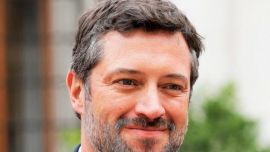Chile’s pro-business economic model can be improved from within and doesn’t need radical reform, according to one of the country’s centre-right candidates who is rising in the polls ahead of the presidential election in November.
Among Latin America’s richest economies, Chile will rewrite its constitution under the ascent of independent and leftist contenders after the country’s biggest social unrest in a generation. Its private pension system, once seen as a model for capital markets in the world, is in a battle for survival, and a front-runner for the nation’s top job is a Communist who tells investors they are part of Chile’s problems.
Sebastián Sichel, a former social development minister under President Sebastián Piñera, is proposing a more nuanced approach to tackle these challenges: in an interview with Bloomberg News, he said Chile’s economic framework can be saved by boosting cash transfers to the poor, improving public services and reducing inequality, all while avoiding the more drastic overhaul backed by his leftist rivals.
“I am going to combat two cancers that are threatening the country,” Sichel said. “The first is the idea of a break from the economic model in general that some sectors on the political left are proposing. The second, which is much more widespread, is populism.”
The 43-year-old is trying to broaden his appeal by running as an independent candidate while boosting ties with conservative parties. One of Chile’s youngest presidential contenders, he is calling for more entrepreneurship and also supports social policies such as same-sex marriage that set him apart from traditional right-wing politics in the country. He is striking a difficult balance as he courts voters who spurned government-backed aspirants in May’s Constitutional Assembly vote.
“We have to put money in the pockets of Chileans fast,” Sichel said.
For that he’s proposing state subsidies to complement incomes for poorer workers, a plan he says other candidates have also been quick to back. Central to Sichel’s strategy is increasing the role that small and medium-sized companies play in the economy while also opening up new markets. He wants to streamline bureaucracy and cut down on excessive spending.
One of his first measures would be to extend operating times for government offices that serve the public. Some essential services close at 2pm with people still waiting for help.
“I’ll end with this sense of abuse by public services,” Sichel said during the interview.
Growing interest
Early polls suggest that Sichel’s backing is growing. A public opinion survey released this week showed him garnering nine percent voter intentions, roughly double the amount he had at the end of April. The increase puts Sichel within four percentage points of Joaquín Lavín, 67, the most popular right-wing candidate at the moment and one of Chile’s best-known politicians.
Sichel will face off against Lavín, as well as former finance minister Ignacio Briones and ex-defence minister Mario Desbordes in the July 18 primary among centre-right contenders. The first round of presidential elections will take place November 21, with a possible run-off scheduled for December.
In 2018, Piñera tapped Sichel to be the executive vice-president of economic development agency Corfo, and later nominated him to run the Social Development Ministry, where he helped establish an emergency cash transfer programme for poor families. He was previously a director at public relations firm Burson Marsteller and has taught law and communications at local universities.
In recent weeks, Sichel has built out his political campaign by wooing members of Desbordes’ Renovacion Nacional party and Briones’ Evopoli party. Sichel says that his diverse group of advisers also include people from the center-left such as Hugo Lavados, who served as economy minister for former president Michelle Bachelet.
Regarding the mining industry, which represents a crucial source of revenue for Chile’s government, Sichel said he opposes creating a tax on sales like the one being discussed currently in congress. He supports instead modifying the existing royalty structure to ensure that funds are transferred directly to mining regions.
“There’s a bit of tax populism going on this year,” he said.
Sichel says he is aware of the discontent with Chile’s economic model that led to the social unrest of late 2019 and early 2020. For that, he wants to reform the current pension system of private saving accounts, with both the state and companies playing a role.
“We need an appropriate social security safety net that helps you if you fall,” Sichel said. “And we need a profound reform of the public system that allows you to get the benefits as soon as you need them.”
related news
by Matthew Malinowski & Eduardo Thomson, Bloomberg























Comments